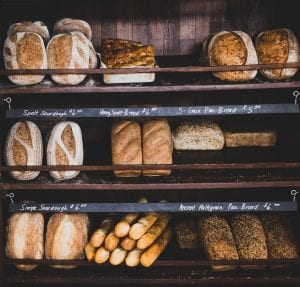




Besides the hard outer shell to protect grains, they also have enzyme inhibitors.
In order to digest food, you require enzymes. In fact, lactose intolerance and gluten intolerance comes from a lack of specific enzymes. Without enzymes, food doesn’t digest. Grains contain enzyme inhibitors that are beneficial for the seeds. Those enzyme inhibitors prevent the plant from sprouting in conditions where they couldn’t survive. If there’s not adequate water and warmth, the inhibitors play a role in the plant’s survival and continuation, waiting to sprout those conditions exist. Those same protease inhibitors in grains can prevent the enzymes necessary for digestion.
The more complex a food, the harder it is to digest.
Simple sugars digest and are absorbed quickly. It’s why it’s the easiest to break down, but not necessarily the healthiest. As food becomes more complex, it requires more steps to fully break down the food. Those with additional chemical bonds are more difficult to digest and may not even be completely digested. That can make you feel uncomfortable and cause an imbalance in your microbiome, which can lead to inflammation and irritation of your digestive tract. It can cause health issues such as autoimmune disease, allergies and leaky gut.
Grains contain phytic acid.
The phytic acid helps protect the seed, but can do damage to your digestion. There are no enzymes to break it down, so it blocks the nutrients available in the seed, such as phosphorus. It also attaches to calcium, zinc, iron and magnesium, which makes it impossible to absorb them in the digestive system. Phytic acid inhibits, pepsin, amylase and trypsin that aids in the digestion of protein and carbohydrates. While there are ways to eliminate the phytic acid, they aren’t done in normal commercial processing. Some problems caused by phytic acid are bone loss, cell and organ damage and leaky gut.
- There are ways to make grains easier to digest. Fermenting, sprouting and soaking the grains before use help remove the phytic acid and eliminate other problems caused by grains.
- Soaking can be accomplished in an acidic medium. Buttermilk, yogurt, lemon juice and apple cider vinegar are examples. Just add a tablespoon or two to the warm water and soak. Sourdough bread is another healthy option.
- Healthier options for bread and other grain products include bread made from flour with sprouted seeds, which not only decreases phytic acid, boosts vitamin C. You can sprout seeds at home or simply buy sprouted flour if you make your own bread.
- The easiest way to find if you have digestive problems due to grains is to remove grains from your diet for several weeks. Elimination diets, which add food back slowly, is another way.
For more information, contact us today at FitForward
